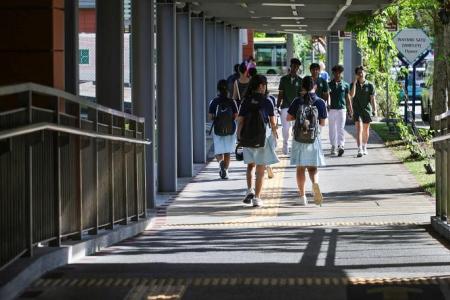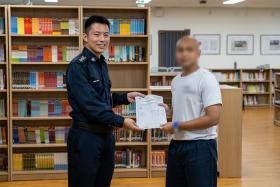Secondary school students to have one common national exam period from 2027
This year’s Secondary 1 students will be the first to sit their national examinations under one common timetable in 2027.
They will sit the new Singapore-Cambridge Secondary Education Certificate (SEC) examinations in 2027 instead of O- and N-level examinations, said Education Minister Chan Chun Sing on March 1 in Parliament.
This comes after the removal of streaming into Normal and Express in secondary schools in 2024, and the implementation of full subject-based banding, where students take subjects at varying levels according to their strengths and interests.
With the change, students will have one written exam sitting for their mother tongue language (MTL) subject and will not be able to retake the exam, said Mr Chan during the debate on his ministry’s budget.
Currently, students are able to choose from two exam sittings for MTL, one in the middle of the year, usually in the first week of the June holidays, and the other during the O-level written exam period, usually in November.
“I understand that some may be concerned that they will have one less chance to improve their MTL grades,” said Mr Chan.
“But we need to strike a careful balance between striving for excellence, chasing the last mark, and allowing our students to learn at a better pace.”
“When we introduced the mid-year O-level MTL exam sitting in 1980, less than 40 per cent of students passed both their first and second languages,” said Mr Chan. “So we allowed students to take their MTL exam twice, to meet the second language requirement for pre-university.”
Today, almost all O-level MTL students meet the language requirement with their first sitting, he said, adding that taking the second sitting changed the post-secondary posting outcomes for less than 2 per cent of those taking the MTL exam.
“The new system will allow our students and teachers to better pace the MTL curriculum, with four more months of learning, rather than to squeeze everything into less than 3½ years in preparation for the June sitting,” said Mr Chan.
Students will sit their English and MTL written exams in the second week of September – one month ahead of other subjects to spread out the exam load, he added.
There will also be one common exam period for the written papers of other subjects, starting in October.
Currently, N-level exams are held in September, and O-level exams in October.
Results for the SEC examinations will be released in January the following year.
Currently, N-level results are out in mid-December and O-level results are released in mid-January the following year.
The SEC will continue to be jointly awarded by the Ministry of Education (MOE) and Cambridge, said Mr Chan.
“Let me state that if we see our worth as being defined by exam results only, removing the PSLE will not remove stress. Neither is removing all stress our goal,” Mr Chan.
“We need to understand that exams like the PSLE and SEC are not an end in themselves, but a means to help our children find a suitable learning environment in the next stage of their education journey.”
Changes to Edusave awards
MOE will also expand Edusave awards to recognise non-academic attributes, said Mr Chan.
From 2024, Eagles, which stands for Edusave Award for Achievement, Good Leadership and Service, will recognise students’ 21st-century competencies, or skills identified as essential for the future.
These include critical, adaptive and inventive thinking, communication, as well as civic, global and cross-cultural literacy, across both curricular and co-curricular activities.
Eagles will also be expanded to Primary 1 to 3 pupils, who were previously not eligible. Up to 5 per cent of this group can qualify and receive an award of $200 each.
The yearly quota for the award for Primary 4 to pre-university students will be increased from 10 per cent to 15 per cent.
With the expansion, an estimated 18,000 additional students could be eligible for Eagles each year. Currently, about 25,000 students receive the award yearly.
The Edusave Skills Award – which recognises excellent professional and soft skills, along with good conduct – will be expanded from 10 per cent to 15 per cent of students in the graduating cohort.
It will also be given to 5 per cent of students in their penultimate year.
The award is available at Crest Secondary School, Spectra Secondary School, specialised schools, polytechnics and the Institute of Technical Education.
About 3,400 more students are expected to benefit from the enhancement.
Mr Chan said these changes will bring the balance of academic and non-academic awards given out to about 60:40, compared with the current 70:30 ratio.
“This signals our commitment to reducing the overemphasis on academic results, and balancing that with better preparation of our students more holistically for the future,” he said.
Get The New Paper on your phone with the free TNP app. Download from the Apple App Store or Google Play Store now


